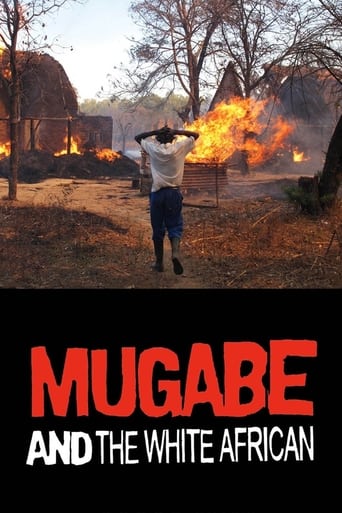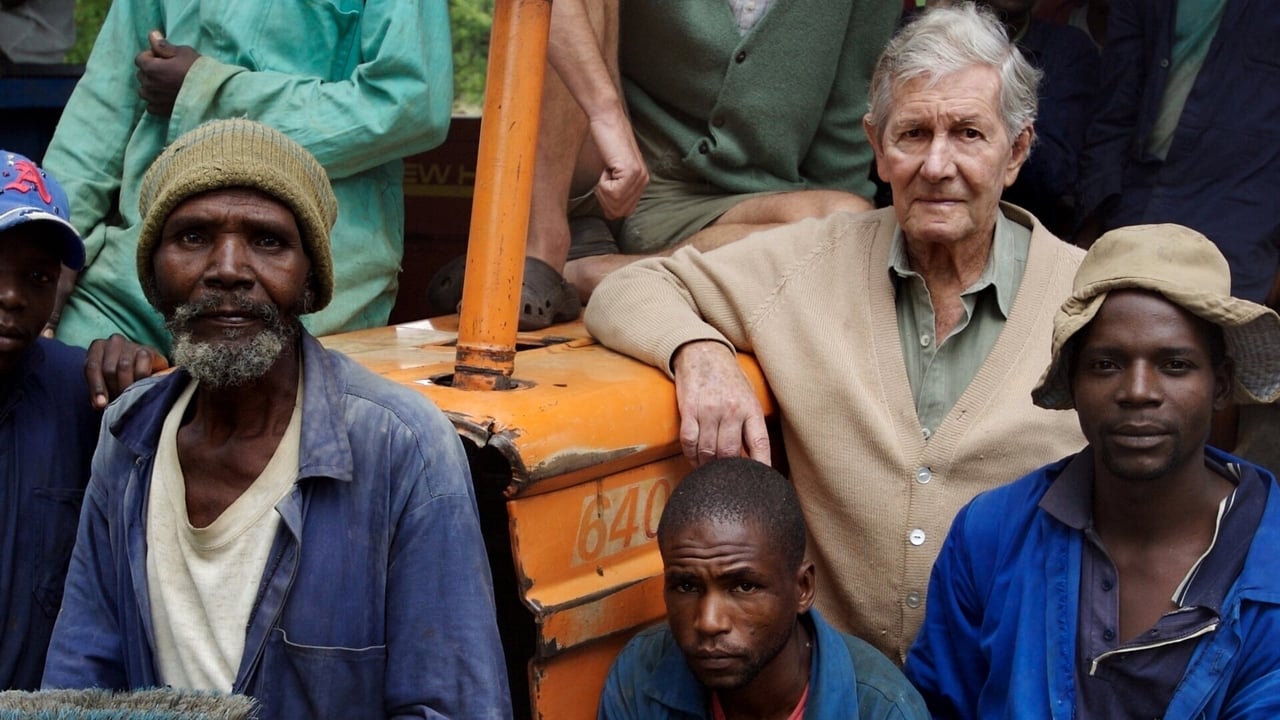sergepesic
Robert Mugabe, the post-colonial leader of Zimbabwe, was in the very beginning praised and lavishly awarded with honorary doctorates. He wasn't a communist and that was the only important thing for the Western powers. Hence, the enthusiastic support of all the murderers in the Latin America. Unfortunately, but quite commonly, the liberator of Zimbabwe became its dictator and tormentor. Even now at 88, he desperately clings to power. This is a story of the horrible plight of the family of white African farmers, who despite of the hopeless situation fight for their bare existence. The movie is powerful and its shaken camera work due to dangerous circumstances, just adds to this horrific story, the heartbreaking urgency.
don2507
This documentary is a moving, emotionally charged film focused on one elderly white farmer and his family as they try to hold on to their farm in Zimbabwe and validate the justice of their cause before the SADC International Court, a kind of International Court of Justice. As much of the film depicts the family's preparation for their court appearance and the associated consultation with their lawyers, the jurisdiction of the court in this matter and what they hoped to achieve from the court's decision was not clear to me. The Assistant Attorney General of Zimbabwe says in the film that this court has no weight on matters within Zimbabwe, while the advocates for Mike Campbell, the white farmer, intend to emphasize the racism of Zimbabwe's "land-reform" by showing that only white farmers are being expropriated.But this film's strength is not on the legal issues, or the political context, but on the courage and strength of character of Campbell, his son-in-law (Ben Freeth) and their wives as they face political and physical intimidation. We see the Zimbabwe government exerting increasing pressure, most ominously through its thugs who seem to enter the farm at will to beat up its workers and tell Campbell and his family that "we don't want you here in Zimbabwe". Campbell does not back down under the intimidation but decides to highlight the justice of his cause by taking his case to the SADC. It's curious to me why the government through its marauders didn't just go in and physically dispossess this family of their farm, killing a few on the way, mostly black African workers, as they did with most of the white-owned farms previously dispossessed. Presumably, Campbell's claim to his farm was more difficult for Mugabe and his minions to wave away; he apparently bought it from another white farmer during Ian Smith's white colonial government a few years before Zimbabwe's independence.Some of these reviews have indicated that no historical context is provided in this film, particularly how white farms were acquired during the colonial period. Well, the film was never meant to be a comprehensive historical review of land acquisition, usage and disposition in Southern Rhodesia / Zimbabwe complete with exposés of Cecil Rhodes and the like. It's a very personal microcosm of the recent "land-reform" in Zimbabwe where President Mugabe plays the "racial card" to dispossess white farmers and transfer their farms to his political supporters somewhat akin to the privatization of Soviet-era state assets to politically-connected insiders. Unfortunately, these were not accomplished farmers, and Zimbabwe's food exports have dropped significantly since the dispossessions. Indeed, it's hard to imagine anyone in a democratic country retaining power whose stewardship of his nation's economy has resulted in 80% unemployment and 100 billion (?) % inflation without resort to violent intimidation as Mugabe has done. You can see the look of fear in the faces of the black farm workers as Mugabe's thugs intimidate them and their livelihoods are threatened. I wished the film focused a bit more on these workers who have much to lose from this "land-reform"; perhaps they were reluctant to talk for fear of what might happen to their families.In summary, this is a powerful drama that needs to be told; and I'll conclude with two comments: (1) if you live in a nation that goes by the rule of law,and not the rule of men, be thankful, and (2) imagine the form of land-reform that a Nelson Mandela might have initiated in Zimbabwe, a more just, evolutionary approach with fair compensation and allocation of the land to experienced farm workers of all political stripes who don't necessarily have to be Mugabe's "bush veterans". Just compare the Mandela of "Invictus" and the Truth and Reconciliation Commission to the Mugabe regime and his election-time rhetoric:"the whites are gathering at our borders and getting ready to take your land back" (reported in AP).
MartinHafer
This film is compelling but also seems very incomplete. That's because the context for what is occurring is missing--and the film is hard to relate to as a result. If you are unaware of the political situation in Rhodesia/Zimbabwe over the last 40 or so years, the film is difficult to understand or relate to. Giving this complete picture would have fuzzied up the story a bit but also made it more honest in dealing with the land reform debate.First, Rhodesia was a racist country--much like South Africa during Apartheid. There is no justification for this--it was bad and you certainly could understand resentment among blacks in the country towards their overlords. This is not addressed in the film and as one reviewer correctly stated, the family featured in the film bought their land from this racism regime. And, a lot of black Africans felt taking the land away was a case of payback--payback for being among the elite.Second, when Robert Mugabe became leader of Zimbabwe, people in the West generally approved of him. He was seen as a moderate and one of the better African leaders--receiving honorary degrees from major universities abroad as well as honors from the British government. Part of this, I'm sure, was the West's relief that Mugabe was better than the communists who had tried to gain control of the new nation. HOWEVER, over the years, Mugabe turned out to live by one rule...whatever is best for Mugabe! Whatever it took to remain in power, he did. If it meant appealing to the uneducated masses by proclaiming land reform, he did it--even though the way it was done was haphazard AND the standard of living for the Zimbabwean people actually got much worse and mass starvation resulted!! He and his friends, however, didn't suffer during this horrible economic slide--and, in effect, he and his friends became the whites in charge of the nation! In addition, any real efforts to wrest him from power or mount an opposition were crushed--seemingly by 'the people'. In other words, Mugabe gave consent to roving gangs to kill or intimidate opposition. Mugabe himself behaved like he had no control over this--that it was a popular movement. But, as President for Life and dictator, he could have stopped it but instead fomented race and class hatred for his own means.So, put in its context both the pro- and anti-land reform groups have ammunition for their case. It sure complicates things but also gives a much more accurate view of the overall picture. I sure would have liked to see and hear this information in this film.So how about this movie? Well, it gives the story of one particular farmer and his family that were hold-outs--among the last of the white farmers to remain in Zimbabwe. The rest were beaten and chased from the country or killed. It is sad. It is very compelling--especially when the family was severely beaten by the Mugabe-sanctioned mobs. Taking the land with no compensation whatsoever just seemed wrong--especially since the criteria used for taking the land was the color of his skin. It does make this point well if the film does not intend to educate you about the whole picture but only the plight of the family and nothing more. Considering how long it took to make the film, the risks to their safety and the quality of the production, I'd recommend it even if the film is incomplete. My advice is to see this film but only after reading up on the country and its history. Perhaps there is a good documentary about Mugabe out there and that would be a good place to start.By the way, had the film given a more thorough view of the context for the events in the film, I don't think it would have significantly harmed their case---it still would have been a moving story.
davideo-2
STAR RATING: ***** Saturday Night **** Friday Night *** Friday Morning ** Sunday Night * Monday Morning Tyrant Robert Mugabe's reign of terror in Zimbabwe has seen this troubled part of Africa descend into chaos, with it's expulsion from the British Commonwealth (presumably due to it's human rights violations?!?) and roughly 4000 acres of land brutally seized from white land owners in Mugabe's racist Land Reform programme, as his Zanu PF party strives to continue it's reign of terror in an area of the world where democracy is of no true force whatsoever. In the middle of this, elderly Mike Campbell and his son are setting plans in motion for an historic court battle where their future on the land they have legally owned for years is in jeopardy, whilst ducking the legal obstacles of constant postponements and a ruling force that considers itself above the legal rulings of the court, as well as just trying to achieve fairness and justice in a lawless area of the world.From the off set, we're informed the makers of this film risk imprisonment just for filming it, so naturally a lot of the filming takes place in strategically placed locations in secluded areas, which cuts out a lot of the background and thus a lot of the atmosphere of the film. But the chaotic and deadly world it is sucking you in to is so intriguing and eye opening that this is a minor hindrance, especially if you think they're doing as good a job as they possibly can. The only times when I really lost my temper with it, due to my motion sickness, was the shaky camera moments, but what can you do?Despite his predicament, Mike and his son are calm, mild mannered and rational, even as we see their constant court date postponements, intimidation from Zanu PF supporters, the horrific experiences of other land owners and supporters and even their own savage beating at the hands of Mugabe's thugs. Thoroughly decent people trying to stake their place in the world with dignity and humanity, while their enemies do the exact opposite. Despite being an eye opener to the situation in Zimbabwe, it ultimately emerges as a simple tale of the little man taking on the big bully boys, going through hell to get there and being able to enjoy victory at the end, only for that to be cruelly and outrageously taken away from them. Yet you get the feeling they will stick to their guns and plod on in spite of this, never lowering themselves to Mugabe's level. Sadly, this is the real world and a lot of the time good doesn't triumpth over evil, but at least our hope and spirit can be kept alive if we keep believing? That's the underlining message of this daring and eye opening insight into the heart of Africa. ****


 AD
AD

